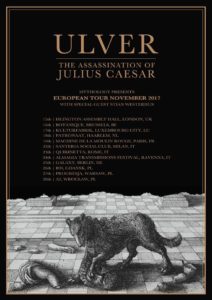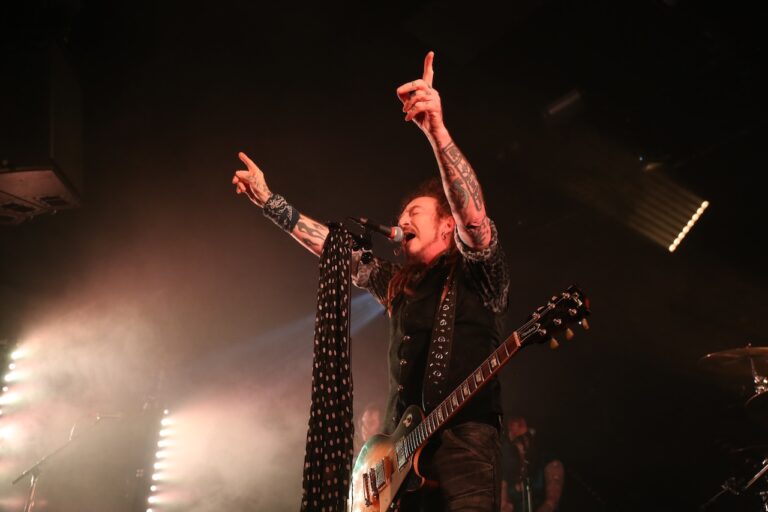If the greatest trick the Devil ever pulled was to convince people that he didn’t exist, then surely the greatest trick a (former) metal band ever pulled was to pack out a venue with a diverse, predominantly metal oriented, crowd and then subject them to a sensory overload pitched somewhere between Pink Floyd, the Orb and Frankie Goes to Hollywood (yes, you did read that last name right). And yet, on a cold night in November, that is precisely what Ulver, once purveyors of atmospheric black metal and now a force entirely of their own making, have succeeded in doing.
It is now some twenty-two years since Ulver made the unlikely pairing of Dead Can Dance and Darkthrone on their 1995 debut, ‘Bergtatt’ and twenty since the band last dabbled in anything resembling black metal, albeit with an album so unhinged in ‘Nattens Madrigal’, that it is hardly surprising they felt there was nowhere left to go in that particular direction. Nonetheless, a cursory glance at the t shirts on display suggest that the band have done much to retain an extreme metal fan-base over the years despite consistently distancing themselves from any form of genre, extreme or otherwise.
Tonight sees the band indulge in a rare tour in support of their latest effort, the mesmerising ‘pop’ outing ‘the assassination of Julias Caesar’. An insanely catchy album, ‘…Caesar…’ is primarily electronic in nature and whilst Stian Westerhaus (who also opens the show with half an hour of ambient drone) is present on guitar, it’s hard not to come to the conclusion that you could strip away his presence with no discernible effect on the music the band are now creating.
The show itself is astonishing. With the band barely visible and banks of lasers creating a condensed Pink Floyd experience, Ulver set about reproducing a re-sequenced ‘…Caesar…’ for a packed-out Islington Assembly. The audience range from the utterly entranced to the marginally baffled, but for those who get it, this is a concert of a life-time. The band open with the pulsing ‘Nemoralia’, a highlight of the album and a deadly earworm to boot. Immediately the audience are ensnared by the pristine sound and sensory overload of the light show. The band can barely be seen, but every so often a pair of drum sticks will pierce the laser beams that blaze out across the hall, whilst laser fireworks trace patterns across the backdrop. The song is over in a heartbeat, the band immediately heading into the synth-heavy, eighties synth-pop-isms of ‘southern gothic’ as lights pierce the gloom and the audience find themselves drawn into an experience that parallels how early rock audiences must have felt when witnessing the Floyd for the first time. ‘1969’, with its dark-side-of-the-sixties lyrics, follows before we get another album highlight in ‘so falls the world’, a contemplative track that sees the lyrics reproduced on the screen behind the band. Kristoffer Rygg’s voice is stunning here (and throughout) and there is palpable tension as he pours the very essence of himself into the song. Even familiarity with the album fails to blunt the impact when the piece mutates into a full-blooded dance number reminiscent of Underworld.
The closest we get to ‘perdition City’-era Ulver is in the cataclysmic, jazz-freak out that concludes the lengthy ‘rolling stone’, a track which is placed second on the album, but which benefits, in the live environment, from a little more distance form the opening. It sounds huge, and the gentle, shimmering ‘Transverberation’ provide a touch of much-needed relief from the sonic might of its forebear. If ‘Angelus Novus’ drifts dreamily by in a haze, then the monumental finale of ‘Coming Home’ sees the track, already lengthy in its album incarnation, extended to behemoth proportions, the band building over industrial-strength percussion and half-spoken poetry to an explosive finale.
As I write this, I’m conscious that nothing can truly compare to being physically present at such a gig. The lasers filtering through the smoke, the heat of the crowd and the beautifully-paced performance – this is art rather than music and it says much of the inclusive nature of the band that they make the audience feel a part of it without engaging in any of the audience participation that you’d normally associate with such music. It’s intense, magical, transcendent – the most life-affirming moment of their career to date – and it leaves you feeling utterly elated.
With the album dispensed with, Ulver conclude their set with a rendering of the brand-new EP, ‘sic transit Gloria’. The pulsing ‘Bring Out Your Dead’ opens up proceedings, the arpeggiated synths and reverb-drenched vocals giving way to a track that is pure eighties pop with an industrial edge. The EP’s opening track, ‘Echo Chamber (Room of Tears)’ proves to be a rather more reflective piece, reminiscent of Toro Y Moi, albeit with dark stabs of guitar sending forks of lightning across its surface. The biggest surprise of the evening however, is reserved for a rendition of Frankie Goes To Hollywood’s ‘the power of love’, the surprise being that, in hindsight, it’s no surprise at all.
Ulver’s musical evolution remains a thing of mysterious elegance. Where they’ll go from here is anybody’s guess, but the fact that they were able to draw a predominantly metal crowd into a concert that ostensibly recreates the synth-heavy sounds of the eighties filtered through a fine progressive rock gauze speaks volumes, both about their own magnetic draw and about the open-minded nature of rock fans. Few concerts are so utterly absorbing, and my only regret is my seeming inability to truly capture the majesty of an utterly unique evening. 10




